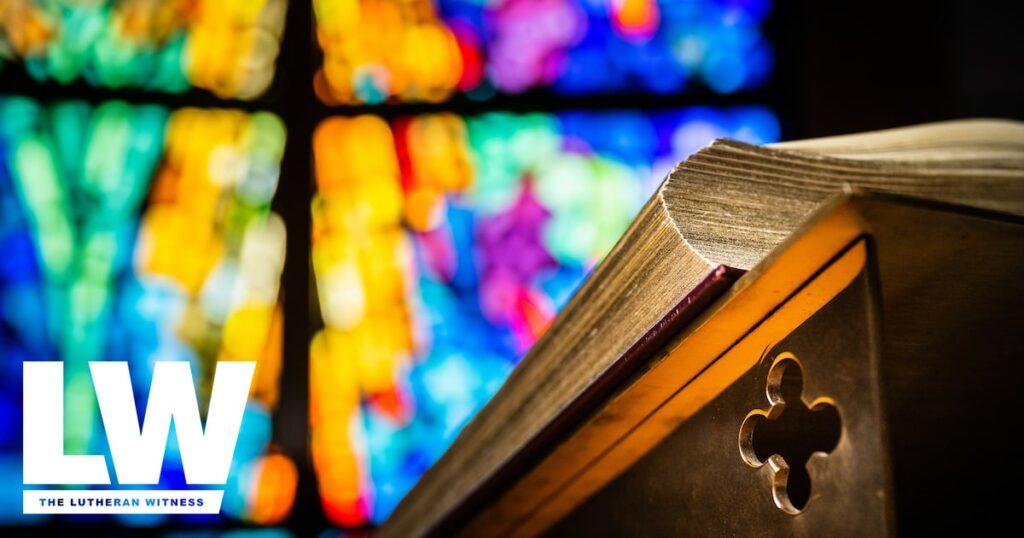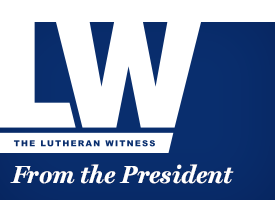An excerpt from Matthew C. Harrison’s “A Little Book on Joy” (St. Louis: Concordia Publishing House, 2011), 162–64.
“Finally, brothers, rejoice. Aim for restoration, comfort one another, agree with one another, live in peace; and the God of love and peace will be with you. Greet one another with a holy kiss. All the saints greet you. The grace of the Lord Jesus Christ and the love of God and the fellowship of the Holy Spirit be with you all” (2 Cor. 13:11–14).
The Bible teems with joyous, paradoxical truths. God is three in one. God is man. God dies on a cross. The God who visits His vengeance upon trespassers has mercy only on sinners. We die to live. We live to die. The sinner is righteous. The weak are strong. Saints are sinners. Sinners are saints. Afflictions are blessings. The word of man is the Word of God. The poor are rich, and the rich poor. The first are last, the last first. Law and Gospel. It is a hallmark of faithful Lutheranism that it does not, as a matter of principle, try to resolve these paradoxes. Is it bread, or is it body? The texts simply state that it is both.
Wherever the point of truth in tension is resolved, the paradox diminished or even abandoned altogether, both faith, i.e., belief and trust in Christ, and “the faith delivered once for all to the saints” (Jude 1:3; i.e., the faith which is believed), are at worst laid waste and at best labor under its weaker caricatures. So, for instance, if the tension between Law and Gospel is resolved in the direction of the Law, the result is works righteousness, legalism, and rule-based religion with Christian trappings (Galatians 3). If the tension is loosed in the other direction, the Gospel becomes a caricature of grace in Christ, and the result is antinomianism and disregard for the created order (1 Corinthians 5–14). Grace devolves into “tolerance” and universalism, i.e., many ways to heaven. H. C. Schwan noted: “Evangelical practice is equally far removed from antinomian and from legalistic practice” [H. C. Schwan in At Home in the House of My Fathers (CPH, 2011), 487]. Thank God that the word is so powerful that it delivers its gifts, if only it’s not distorted beyond recognition, by and among us (1 Corinthians 1:7).
The maladies in the life of the twenty-first century church, and in the Church in every age for that matter, are the result of missing the “narrow way” (Matthew 7:13–14). It is for me a paradox itself, that the “high” road of orthodoxy — right teaching and right praise — is freeing! For ortho-dox-y is both right doc-trine and right dox-ology (or praise). It also leaves plenty of space for us to rejoice in God-pleasing differences of gifts, emphases, practices, and even personalities.
The Church is a paradox. She is the Bride of Christ, “spotless,” “holy,” “washed,” (Ephesians 5:25–27), the “pillar and foundation of truth” (1 Timothy 3:15), the body of Christ (1 Corinthians 12:1ff.). And yet she only appears in this world hidden under the guise of poor sinners, flawed leaders, tensions, divisions, and even false teaching. This is at once both disturbing and comforting. It is disturbing because we find ourselves in such “spotted” congregations, denominations, and Christendom. It is comforting because — despite its outward appearance, despite the fact that there have been times in the history of the church when the pure teaching of the Gospel all but disappeared from the public confession of the Church and its practice — nevertheless, the “gates of hell shall not prevail against it” (Matthew 16:18). The Church endures because Christ endures, and He will never let His Gospel go un-believed, until the end of time. That’s worth rejoicing over, especially in the times in which we live. And there is also comfort in knowing that because the Church exists well beyond the genuine Lutheran Church, we will also find truth spoken by others. And when we do, we are free to heartily and gladly acknowledge it as such.
This is why neither people nor faith in the heart are the infallible marks of the Church’s presence. Wherever the Gospel and Sacraments are — enough to bring people to true faith in the true Jesus — there is the Church (Augsburg Confession VII). Genuine Lutheranism retains this tension, the paradox of the New Testament.
–Pastor Harrison






The long road from Pentecost is still a straight one, and the Holy Spirit goes where He wills to declare many holy who are anything but. It is the action of God to declare a saint what he or she is not: saintly. It is the work of God and not of man, but paradoxically, God uses people to connect to other people. We are still in the Pentecost by the Spirit’s work, through Word and Sacrament.
Seeing mention here of the “marks of the Church’s presence,” I am reminded of what Jesus said: “By this all people will know that you are my disciples, if you have love for one another.” (John 13:35 ESV)